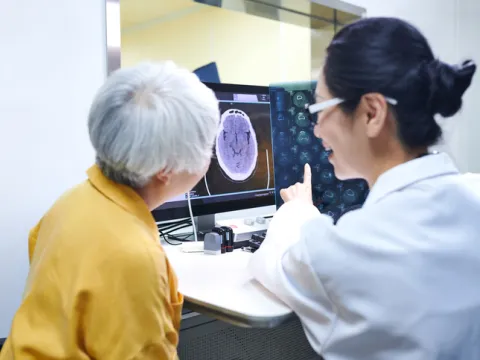- AdventHealth
AdventHealth, one of the nation’s largest faith-based health care systems, is using artificial intelligence (AI) to improve patient care. While AI tools are generating excitement on a global scale, the organization is taking great care in choosing which ones to invest in.

“We’re not just throwing generative AI into healthcare,” Rob Purinton, AdventHealth’s vice president of analytics and performance improvement, explained to reporter Seraine Page in this Evolve Magazine article. Purinton added that all AI vendors must pass a rigorous reviewal process with patient privacy and data security at the forefront of those decisions.
“We rejected an AI tool this summer because the data was going overseas for storage. We had enough concerns about the security of data, so we passed on that one,” he said. “We have to look under the hood and see where data is going and how it’s being used and stored.”
Today, the nation’s only non-profit system headquartered in Florida uses AI to help diagnose and treat various medical conditions, such as strokes, where time is a critical component of patient care.
In 2020, AdventHealth integrated AI in its imaging departments to help high-stroke-risk patients receive a faster diagnosis, giving them access to life-saving treatment more quickly.
“Time is brain matter in a stroke. We want to respond as quickly as possible,” Purinton said.

Dr. David Sinclair, chief medical officer for AdventHealth Daytona Beach, explains how local imaging facilities are also benefiting from AI in this follow-up Evolve Magazine article.
“Our imaging equipment embedded with AI can produce a drastically better image quality, giving physicians a better look at their patient, all in a fraction of the time,” Sinclair told the Evolve Magazine reporter. “This means patients with a time-critical emergency can get a faster, more accurate scan completed at our emergency rooms and urgent care centers.”
Despite AI’s efficiencies, it is not expected to replace skilled nurses and physicians. Instead, AI tools are anticipated to complement their abilities and expedite patient care.
“AI is helping us capture more accurate, detailed care summaries in our patients’ health records,” Purinton said. “Having reliable and detailed care notes not only helps our patients stay on top of their health, but it also helps our clinicians collaborate more effectively by having a fuller picture of their patient’s whole health.”
Recent News
With an aging population and increases in the prevalence of neurological conditions like Alzheimer’s disease and dementia, physicians and patients alike continue to seek new tools and approaches to...
In a new article published in the medical journal Age and Ageing, AdventHealth Research Institute’s Dr. Audrey Collins shares the results of a recent study evaluating the impact of exercise on...
The AdventHealth Neuroscience Institute is the first in Florida and one of the first in the country to begin recruiting patients with primary progressive or non-active secondary progressive multiple...
Accurately determining food intake remains a challenge in nutrition research. A new study published in Nature Metabolism and co-authored by Dr. Corbin introduces a metagenomics-powered approach to...
Discover what’s being accomplished in Central Florida to bridge the health gap with Orange County Mayor Jerry Demings and AdventHealth’s Dr. Alric Simmonds.
Breakthrough device offers new hope for stroke survivors struggling with rehabilitation following ischemic stroke
Jennifer Seminerio, MD, recently became one of the first in Florida to use intestinal ultrasound (IUS) to help assess and manage treatment of patients with inflammatory bowel disease (IBD). A non...
The Convergent Hybrid Ablation procedure has been gaining acceptance as an effective treatment option for long-standing persistent atrial fibrillation (AFib) since the CONVERGE trial data published in...
Recently, AdventHealth for Children pediatric orthopedic surgeon Sean Keyes, DO, Katelyn Smith, PA-C, and their team performed their 100th bridge-enhanced anterior cruciate ligament (ACL) repair (BEAR...
Physician leaders from AdventHealth’s emergency department, infectious disease, inpatient, pediatrics and pharmacy teams all collaborated to develop a respiratory virus testing algorithm to assist...
Thoracic surgeon Colleen Gaughan, MD, and her team at AdventHealth Celebration, recently became one of the first in the country to incorporate targeted imaging agent Cytalux (pafolacianine) as part of...
On the newest Inspiring Wholeness podcast, Obie Diaz, local morning radio show host, shares how a routine physical eventually led to two open heart surgeries.












